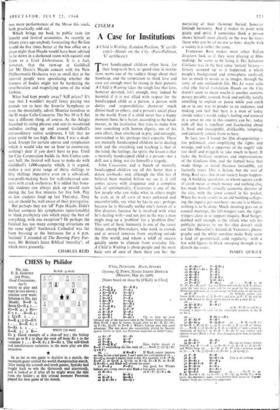CINEMA
A Case for Institutions
A Child is Waiting. (London Pavilion, 'X' certifi- cate.)—Hands on the City. (Paris-Pullman, 'U' certificate.) THAT handicapped children often have, for their long-term best, to spend time in institu- tions seems one of the saddest things about their handicap, and the temptation to think love and care are enough must be strong in their parents. A Child is Waiting takes the tough line that love, however devoted, isn't enough, may indeed be harmful if it is not allied with respect for the handicapped child as a person, a person with duties and responsibilities (however much diminished) to others, and a person's social place in the world. Even if a child never has a happy moment there, he is better, according to the head- master, in the institution that tries to make him into something with human dignity, out of his own effort, than smothered in pity and untaught, unstretched to his (perhaps tiny) capacity. These are mentally handicapped children we're dealing with and the stretching and teaching is that of the mind, the feelings, the spirit; the lesson is that a mentally handicapped child is a person—not a doll, not a thing, not (to himself) a tragedy.
John Cassavetes and a bunch of mentally handicapped children say all this better than a dozen textbooks and, although the film has (I believe) been mauled before we see it, it still comes across with eloquence and a complete lack of sentimentality. Cassavetes is one of the few people who can make what in others might be arch, or in all sorts of ways awkward and uncomfortable, say what he has to say: perhaps because he is blessedly unlike one's notion of a film director, because he is involved with what he's dealing with----and not just in the way a man might mug up a 'problem' for a 'problem film.' This sort of basic humanity is one of the rarest things among film-makers, who work in crowds and at several removes from anything outside the film world, and whom a whiff of success quickly seems to alienate from everyday life. A Child is Waiting is about people and the most basic sort of care of them there can be: the
nurturing of their (however buried, however limited) humanity. And it makes its point with gaiety and spirit. I sometimes think a person shows himself most clearly in the way he treats those who can be of no use to him: maybe with a society it is rather the same.
• Francesco Rosi makes most other Italian directors look as if they were playing at film- making: he seems to be living it. His Salvatore Giuliano was in the best sense 'instant' history— history scooped up as it happened, a whole people's background and atmosphere analysed, not so much in words as in images, through the story of one outlandish life. His Le wad sulla cilia (the literal translation Hands on the City doesn't seem to mean much) is another contem- porary parable, assured, brisk and unfrilly, totally unwilling to explain or pause while you catch up or in any way to pander to an audience, and making you feel that here is a man of today (inside today's world, today's feeling and texture) in a sense no one in this country can be: today with all that is repellent and fascinating about it, hard and inescapable, dislikeable, tempting, and curiously remote from us here.
In fact, too, 1 found the film disappointing— too polemical, over-simplifying the rights and wrongs, and with a supporter of the angels' side too shrill and priggish to take much to heart. It lacks the brilliant surprises and improvisations of the Giuliano film, and the factual basis that made -things so weird (because incredible, yet factually true). This is fiction, but the sort of thing, Rosi says. that in our society keeps happen- ing. A building speculator, to whom square yards of earth mean so much money and nothing else, has made himself virtually economic dictator of the city, with the town council in his pocket. When his work results in an old building collaps- ing, the inquiry gets nowhere: no one is to blame, no-thing is to be done. Much shouting goes on at council meetings, the left-wingers rant, the right- wingers close in to support iniquity. Rod Steiger, dubbed well enough, is the villain who vets his publicity pictures to see his chin doesn't stick
out like Mussolini's. Gianni di Venanzo's photo- graphy and the white sunshine make Italy seem a land of geometrical, cold regularity—with a few wild figures in black sweeping through it to disturb the order.
ISABEL QUIGLY






































 Previous page
Previous page